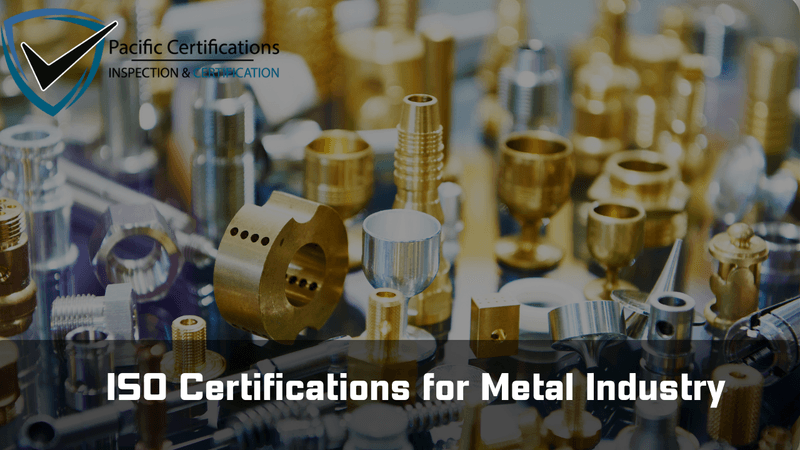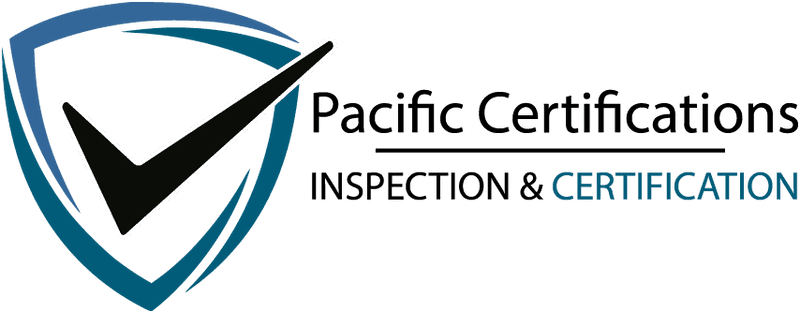ISO Certifications for Metal Industry, Requirements and Benefits

Introduction
The metal industry forms the backbone of industrial development, supplying essential materials and fabricated products to construction, infrastructure, automotive, aerospace, shipbuilding, energy, machinery, defense, and manufacturing sectors. This industry covers a wide range of activities, including metal mining, smelting, casting, forging, rolling, machining, fabrication, surface treatment, coating, and assembly of ferrous and non-ferrous metals such as steel, aluminum, copper, zinc, and alloys.
Operations in the metal sector are inherently high-risk and resource-intensive. Processes involve extreme temperatures, heavy machinery, high energy consumption, hazardous substances, noise, dust, and physically demanding work environments. At the same time, metal manufacturers face increasing expectations from customers, regulators, and global supply chains to demonstrate consistent product quality, worker safety, environmental responsibility, and controlled production practices. Quality failures, safety incidents, uncontrolled emissions, or weak documentation can result in production losses, regulatory penalties, contract termination, and reputational damage.
ISO certifications provide internationally recognized management system frameworks that help metal industry organizations standardize operations, manage risks, ensure compliance, and build long-term credibility in domestic and global markets.
In the metal industry, trust is built on material integrity, safe operations, and disciplined process control.
Quick Summary
ISO certifications provide metal industry organizations with globally recognized frameworks to control manufacturing and fabrication quality through ISO 9001, manage occupational health and safety risks in foundries, mills, and fabrication shops through ISO 45001, control environmental impacts such as emissions, waste, and effluents through ISO 14001, improve energy efficiency in smelting, rolling, and processing operations through ISO 50001, ensure continuity of production and supply in capital-intensive environments through ISO 22301, protect technical drawings, customer data, and commercial information through ISO/IEC 27001, and establish structured risk management across operational, safety, environmental, and compliance risks through ISO 31000. Together, these standards support stable production, regulatory confidence, and sustainable growth in the metal industry.
For guidance on selecting the most relevant ISO standards for your metal industry operations, contact [email protected].
Applicable ISO Standards for Metal Industry
Here are some ISO standards commonly associated with the metal industry:
ISO 9001:2015 - Quality Management Systems
ISO 9001 is central to quality control in the metal industry, supporting consistent management of raw material procurement, melting, casting, rolling, forging, machining, fabrication, surface treatment, inspection, testing, and delivery. It promotes adherence to specifications, control of process parameters, traceability of materials and batches, calibration of measuring equipment, and systematic handling of nonconforming products. For metal manufacturers supplying regulated industries, ISO 9001 provides assurance that products meet defined technical and customer requirements.
ISO 14001:2015 - Environmental Management Systems
Metal production and processing generate environmental impacts including air emissions, slag, scrap, wastewater, oils, chemicals, and noise. ISO 14001 helps organizations identify environmental aspects, comply with environmental regulations, control pollution, manage waste responsibly, and improve environmental performance. This is increasingly important as regulators and customers demand responsible sourcing and environmentally controlled metal production.
ISO 45001:2018 - Occupational Health and Safety Management Systems
Metal industry operations involve significant hazards such as molten metal, high temperatures, heavy lifting, pressurized systems, rotating machinery, cutting and welding operations, noise, dust, and chemical exposure. ISO 45001 provides a structured framework to identify hazards, assess occupational health and safety risks, implement engineering and administrative controls, train workers, and reduce workplace accidents, injuries, and long-term health impacts.
ISO 50001:2018 - Energy Management Systems
Smelting, rolling, heat treatment, and large-scale fabrication are among the most energy-intensive industrial activities. ISO 50001 supports systematic monitoring of energy consumption, identification of inefficiencies, optimization of energy use, reduction of operational costs, and lower carbon emissions. Energy management is a critical competitiveness factor for metal producers operating in volatile energy markets.
ISO 22301:2019 – Business Continuity Management Systems
Metal industry operations depend on continuous production, specialized equipment, skilled labor, and reliable supply chains. Disruptions such as furnace failures, power outages, raw material shortages, labor disruptions, or natural disasters can halt production and cause significant financial losses. ISO 22301 ensures preparedness through business impact analysis, continuity planning, and recovery strategies to maintain or restore critical operations.
ISO 27001: Information Security Management Systems (ISMS)
Metal manufacturers manage sensitive information including product designs, technical specifications, customer contracts, pricing data, and production schedules. ISO/IEC 27001 provides a structured approach to protecting information assets against data breaches, cyber threats, and unauthorized access, particularly in increasingly digitalized production and supply-chain environments.
ISO 31000:2018 - Risk Management
ISO 31000 supports structured identification, assessment, and management of risks related to production failures, safety incidents, environmental non-compliance, supply-chain disruptions, regulatory penalties, and reputational exposure. It enables leadership to make informed decisions and proactively manage uncertainty across metal industry operations.
ISO 3834: Quality Requirements for Fusion Welding of Metallic Materials
This standard is crucial for ensuring the quality and integrity of welded products in the metal industry.
Click here to find out more applicable standards to your industry
What are the Requirements of ISO Certifications for Metal Industry?
Metal industry organizations seeking ISO certification must establish documented management systems and demonstrate consistent implementation across production, safety, environmental, energy, and governance functions. Below are the key requirements:
ISO 9001:2015 – Quality Management Requirements
Document production, fabrication, and inspection processes
Define quality objectives aligned with customer and regulatory requirements
Control raw material traceability, heat numbers, and batch records
Manage nonconforming products, rework, and corrective actions
Control process changes and technical documentation
Conduct internal audits and management reviews
ISO 45001:2018 – Occupational Health & Safety Requirements
Identify hazards related to metal processing and fabrication activities
Assess OH&S risks and implement engineering and procedural controls
Provide training, PPE, safe work procedures, and emergency preparedness
Monitor incidents, near-misses, and safety performance
ISO 14001:2015 – Environmental Management Requirements
Identify environmental aspects such as emissions, waste, and effluents
Control hazardous substances, scrap, slag, and wastewater
Ensure compliance with environmental permits and regulations
Monitor environmental objectives and improvement programs
ISO 50001:2018 – Energy Management Requirements
Identify energy-intensive equipment and processes
Monitor energy consumption and performance indicators
Implement efficiency improvements and optimization measures
Review and improve energy performance
ISO 22301:2019 – Business Continuity Requirements
Identify critical production and supply processes
Conduct business impact analysis (BIA)
Develop continuity and recovery plans
Test and review continuity arrangements
Tip:Map one complete metal production cycle—from raw material receipt and melting through fabrication, finishing, inspection, and dispatch—against ISO requirements to identify gaps in quality, safety, and compliance early.
For assistance in evaluating your metal industry operations against ISO requirements, contact [email protected].
What are the Benefits of ISO Certifications for Metal Industry?
ISO certifications provide metal industry organizations with substantial operational and commercial advantages, including:
Improved consistency in metal quality and fabrication accuracy
Reduced defects, rework, and customer complaints
Safer workplaces and reduced accident rates
Stronger compliance with environmental and safety regulations
Better control over suppliers and subcontractors
Improved energy efficiency and cost control
Enhanced credibility with OEMs, contractors, and regulators
Improved audit readiness and inspection outcomes
Eligibility for infrastructure, defense, and export contracts
Long-term operational resilience and sustainable growth
The global metal industry is shifting from volume-driven growth to technology- and R&D-led transformation. The global metals market is valued at over USD 6 trillion, with demand increasingly driven by infrastructure renewal, renewable energy systems, electric vehicles, aerospace, and advanced manufacturing rather than traditional construction alone.
A major industry focus is decarbonization and energy efficiency. Steel and aluminum producers have committed over USD 200 billion globally toward low-carbon technologies such as electric arc furnaces, hydrogen-based production, waste heat recovery, and digital energy optimization. These investments are increasing the importance of measurable environmental and energy performance, directly strengthening the relevance of ISO 14001 and ISO 50001 across metal operations.
From an R&D perspective, demand for advanced alloys, lightweight materials, and high-strength metals is accelerating. Aluminum demand for EV manufacturing is growing at nearly 9% annually, while copper demand is projected to increase by more than 40% by 2035, driven by electrification and grid expansion. This trend requires tighter quality control, traceability, and process validation aligned with ISO 9001.
Digitalization is also reshaping metal production. By 2027, more than 60% of large metal manufacturers are expected to deploy Industry 4.0 technologies such as real-time monitoring, predictive maintenance, and automated quality inspection. As digital reliance grows, information security and operational resilience are becoming production risks, increasing adoption of ISO/IEC 27001 and ISO 22301.
How Pacific Certifications Can Help?
Pacific Certifications, accredited by ABIS, operates as an independent certification body for metal industry organizations by conducting impartial audits against applicable ISO standards. Our role is to objectively assess whether documented management systems and operational practices conform to international ISO requirements, based strictly on verifiable evidence and records.
We support metal industry organizations through:
Independent certification audits conducted in accordance with ISO/IEC 17021
Objective assessment of quality, safety, environmental, energy, and information security controls
Clear audit reporting reflecting conformity status and certification decisions
Internationally recognized ISO certification upon successful compliance
Surveillance and recertification audits to maintain certification validity
Contact Us
For ISO certification for metal industry organizations, contact [email protected] or call +91-8595603096.
Author: Pushpinder K
Read More at: Blogs by Pacific Certifications

